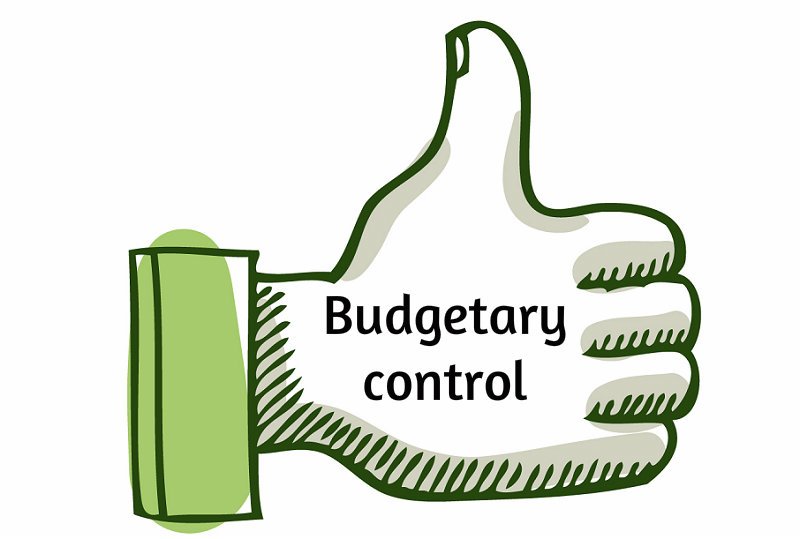Budgetary control is the process of determining various budgeted figures for the enterprise and then comparing the actual performance with the budgeted figures for calculating the variances, if any.
Definition of Budgetary control
The Chartered Institute of management Accountants, London, defines the budgetary control as “The establishment of budgets relating to the responsibilities of executives to the requirements of a policy, and the continuous comparison of the actual with the budgeted result, either to secure by individual action the objective of the policy or to provide a basis for its revision”.
Thus, establishment of budgetary control involves the following:
- Establishment of budgets.
- Revision of budgets in the light of changed circumstances.
- Continuous comparison of actual with the budgets for achievement of targets and fixing the responsibility for failure to achieve the budget figures.
The position of budgetary control can be likened or compared to the navigation of a ship, across the seas.
Objectives of Budgetary control
The main objectives of budgetary control are as under:
- To co-ordinate the activities of different departments.
- To operate various cost centers and departments with efficiency and economy.
- Fixation of responsibility of various individuals in the organization.
- To ensure a system for correction of deviations from established standards.
- To centralize the control system and
- To ensure planning for future by setting up various budgets.
Advantages of Budgetary control
Budgetary controls are as an important tool for the management to economise costs and maximize profits. The system helps the management to set up the goals.
The following are the advantages of budgetary control system.
1. Profit Maximisation
The resources are put to best possible use, eliminating wastage. Proper control is exercised both on revenue and capital expenditure.
To achieve this, proper planning and co-ordination of various functions is undertaken. So, the system helps in reducing losses and increasing profits.
2. Co-ordination
The budgets of various departments have a bearing with each other, as activities are inter-related. As the size of operations increases, co-ordination amongst the different departments for achieving a common goal assumes more importance.
This is possible through budgetary control system.
3. Communication
A budget serves as a means of communicating information throughout the organization because every department knows the performance expectation and authority for achieving the same.
4. Tool for measuring performance
Budgetary control system provides a tool for measuring the performance of various departments. The performance of each department is reported to the top management.
5. Economy
Planning at each level brings efficiency and economy in the working of the business enterprise. Resources are put to optimum use to achieve economy. All this leads to elimination of wastage and achievement of overall efficiency.
6. Determining Weakness
Actual performance is compared with the planned performance, periodically, and deviations are found out. This shows the variances highlighting the weakness, where concentration for action is needed.
7. Consciousness
Budgets are prepared in advance. So, every employee knows what is expected of him and they are made aware of their responsibility. So, they do their job uninterrupted for achieving what is set to him to do.
8. Timely Corrective Action
The deviations will be reported to the attention of the top management as well as functional heads for suitable corrective action, in time.
In the absence of budgetary control, deviations would be known, at the end of the period, and there is no time and opportunity for necessary corrective action.
9. Motivation
Success is measured by comparing the actual performance with the planned performance. Suitable recognition and reward system can be introduced to motivate the employees, at the levels, provided the budgets are prepared with adequate planning and foresight.
10. Management by Exception
The management is required to exercise action only when there are deviations. So long as the plans are achieved, management need not be alerted. This system enables the introduction of Management by Exception for effective delegation and control.
Limitations of Budgetary control
Budgetary control is a sound technique of control but is not a perfect tool. Espite many good points, it suffers from the following limitations.
1. Uncertainly of future
The budgets are prepared for the future periods. So, budgets are prepared with certain assumptions. There is no certainty that all the assumptions prevail in future. With the change in assumptions, the situation in future changes, Due to this, the utility of budgetary control reduces.
2. Problem of Co-ordination
The success of budgetary control, largely, depends upon effective co-ordination. The performance of one department depends on the performance of the other department.
3. Not a Substitute for Management
Budgetary control helps in decision making but is not a substitute for management. A budgetary programme can be successful, if there is proper administration and supervision.
4. Discourages Efficiency
Every person is given a target to achieve. So, everyone is concerned only achieving the target of his own. This is the common tendency. So that budgets may serve as managerial constraints, unless suitable award or incentive system is introduced.
5. Timely Revision Required
Budgets are prepared on certain assumptions. When those conditions do not prevail, it becomes inevitable to revise the budget. Such frequent revision of budgets reduces the reliability and value. Revision of budgets involves additional expenditure too.
6. Conflict among Different Departments
For the success of budgetary control, coordination of the different departments is essential. Every department is concerned with the achievement of the individual department’s goal, not concerned with the final goal of the enterprise.
7. Depends upon support of top management
The success of budgetary control depends upon the support of top management. If the top management is not enthusiastic for its success, the budgetary control will collapse.
So, the whole-hearted interest of top management is highly essential for its implementation, in its true spirit, to make it workable and succeed.
Conclusion
Budgetary control system acts as a friend, philosopher and guide to the management. The current performance is compared with the pre-planned performance to ascertain deviations so that corrective measures are taken, well at the right time.
Related Topic:-













